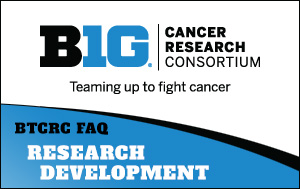Aug. 17, 2015:
What type of trial is the Big Ten Cancer Research Consortium (Big Ten CRC) looking to perform?
The Big Ten CRC’s mission is to perform novel, hypothesis-driven, highly translational oncology trials. Two other important components in Big Ten CRC trials is mentorship between junior and senior investigators as well as cross-collaboration between Big Ten CRC institutions. See the complete list of Big Ten CRC Research Criteria.
How do I submit a concept to the Big Ten CRC?
Send a completed LOI to Jessica Roy at jroy@bigtencrc.org. If the funder already has an LOI template, please use the funder’s document. If you need an LOI template, please visit the Big Ten CRC website to download the LOI.
Which working groups are currently active? How do I join a working group?
Nine clinical trial working groups (CTWGs) have been activated: breast, gastrointestinal, genitourinary, gynecologic, lymphoid malignancies, melanoma/cutaneous oncology, multiple myeloma, myeloid malignancies, and thoracic. Contact Donna Sullivan at dsullivan@bigtencrc.org to join a working group. You can also join a working group directly through the Big Ten CRC website.
When new concepts are received, they are assigned to the next CTWG agenda for group review and input. Ad hoc calls are arranged as needed. Concepts with majority approval will move into active development.
At what point should I submit my concept to the Big Ten CRC?
The earlier the better! Administrative headquarters (AHQ) will assist you in drafting an initial budget, preferably prior to submission of an LOI to a potential funder. In addition, the input you receive from the working group strengthens the proposal, increasing the likelihood of an approved proposal.
Does the Big Ten CRC provide funding for my trial?
No, not currently. Trials need to be fully funded to open within the Big Ten CRC. However, funding may come from a variety of sources in order to fund all aspects of the trial (pharma, grant, foundation, etc.). Big Ten CRC leadership are actively working on fundraising initiatives to supplement unfunded trial objectives in the future.
What assistance do you provide to the PI early in the trial process?
The Big Ten CRC administrative headquarters provides comprehensive study support from conception and design through project completion and publication. Early in the process, staff are available to provide input on the LOI, draft the initial budget, upload and monitor the LOI submission, and survey Big Ten CRC sites for interest and accrual estimates. Once the LOI is approved, staff are available to coordinate the development of the final protocol and draft the informed consent document.
I’ve heard people talk about Hoosier Cancer Research Network. Who are they and how do they relate to the Big Ten Cancer Research Consortium?
Hoosier Cancer Research Network (formerly known as Hoosier Oncology Group) is an independent nonprofit organization with more than 30 years of experience managing multicenter investigator-initiated clinical research trials. The Big Ten cancer center directors selected HCRN as the Big Ten CRC’s clinical research organization (CRO) to provide centralized, standardized trial management of all Big Ten CRC trials.
About the Big Ten Cancer Research Consortium: The Big Ten Cancer Research Consortium creates a unique team-research culture to drive science rapidly from ideas to treatment-changing paradigms. Within this innovative environment, today’s research leaders collaborate with and mentor the research leaders of tomorrow with the unified goal of improving the lives of all patients with cancer.
About the Big Ten Conference: The Big Ten Conference is an association of world-class universities whose member institutions share a common mission of research, graduate, professional and undergraduate teaching and public service. Founded in 1896, the Big Ten has sustained a comprehensive set of shared practices and policies that enforce the priority of academics in the lives of students competing in intercollegiate athletics and emphasize the values of integrity, fairness and competitiveness. The broad-based programs of the 14 Big Ten institutions will provide over $200 million in direct financial support to almost 9,500 students for more than 11,000 participation opportunities on 350 teams in 42 different sports. The Big Ten sponsors 28 official conference sports, 14 for men and 14 for women, including the addition of men’s ice hockey and men’s and women’s lacrosse since 2013. For more information, visit www.bigten.org.

















Subscribe to the Big Ten CRC Newsletter X
X Facebook
Facebook YouTube
YouTube